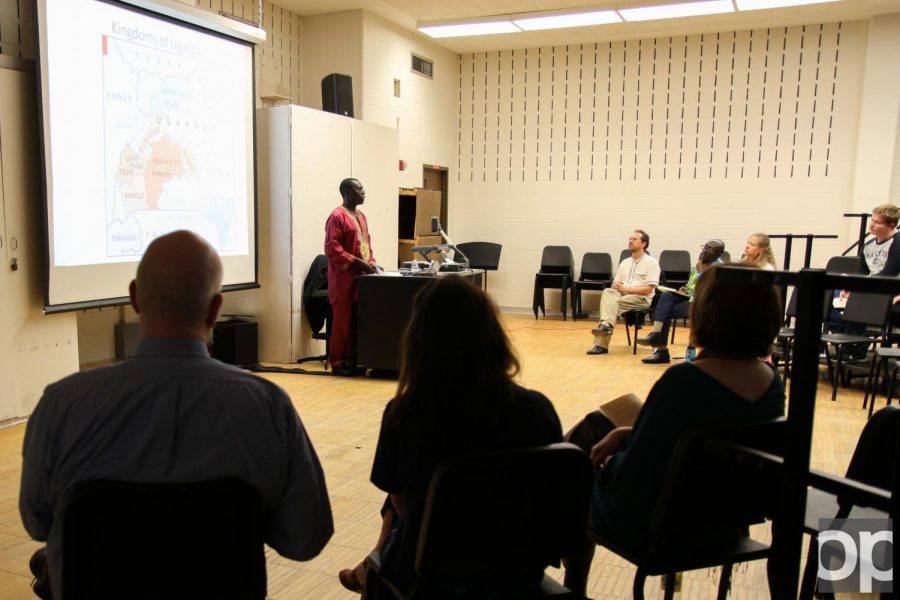OU’s school of MTD hosts an enlightening symposium on royal court music traditions from esoteric cultures
Oakland University’s school of Music, Theatre and Dance hosted the event, “Royal Court Music from East and West Africa: Ethnomusicology Symposium with James Isabirye and Kwasi Ampene” from 7-9 p.m. in Varner Hall on Oct. 4.
The presentation was given by Isabirye and Ampene on their understanding of royal court traditions in both Uganda and Ghana through the lens of ethnomusicology.
“As I understand it, ethnomusicology is a branch of music that seeks to understand society and humans by studying human engagements in musical practices and related cultural expressions,” Isabirye said.
Isabirye, a doctoral student studying music education, spoke about his experience leading a revival of six royal music practices in Uganda in the last five years. Some of these practices included bigwala (gourd trumpets) music and dance of the Busoga kingdom, entenga (tuned drums) music of the Buganda kingdom, amakondere (gourd trumpets) music of the Buganda kingdom, Kimasa (bow harp) music of the Busoga kingdom, naizungwe (drums) music of the Busoga kingdom and endere (notched flute band) music of the Buganda kingdom.
“These are cultural expressions that need to be acknowledged and valued without subjecting them to external prejudice,” he said.
Ampene is a professor of African studies and Ethnomusicology at the University of Michigan. He is known for his research on the history of Asante royal regalia and music ensembles in Ghana. He wrote a book on the topic titled, “Engaging Modernity: Asante in the Twenty-first Century.”
“Aside from my mission in Ghana, I am also on a mission here,” Ampene said. “When I say the Asante people survived, I mean the people did but a lot of the culture did not.”
Ampene is humble about his work and gives more credit to the Asante people for keeping the traditions alive.
“We have to recognize the knowledge from these people,” he said.
Ampene stated that even though his books are sitting on the shelves in these academic libraries, what fills him with the most pride is knowing that it is helping to preserve groups who originate these traditions.
In the discussion portion of the presentation, both Ampene and Isabirye touched on the concept of globalization. They discussed how with technological advancement, modern culture has become more accessible to younger generations. Over time this has influenced music practices in esoteric cultures such as these. Essentially, people are losing interest in their own cultural traditions because they aren’t taking the time to understand them.
“Culture is a critical aspect that has been ignored in the development debate, and there is so much waste happening as a result of neglecting culture,” Isabirye said.
Isabirye and Ampene share the common belief that a person’s culture is a definitive part of who they are. Now that people are failing to recognize their own roots, they feel more obligated as educators to try to help people today realize that we need to preserve these cultures. Without them, we are losing such a powerful essence of historical groups in other parts of the world like Uganda or Ghana.






